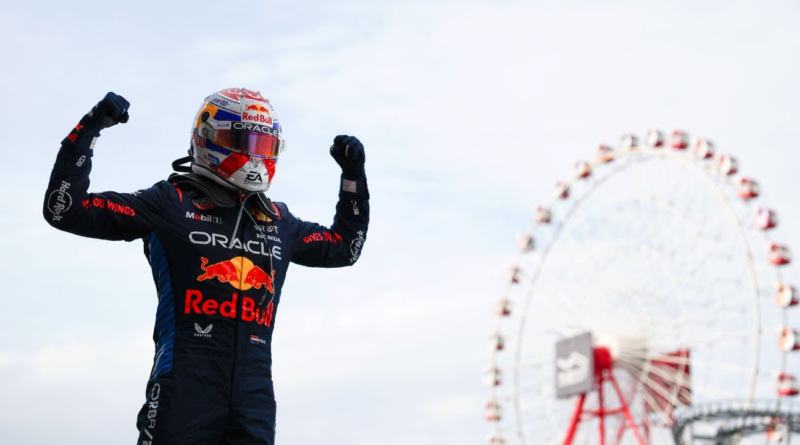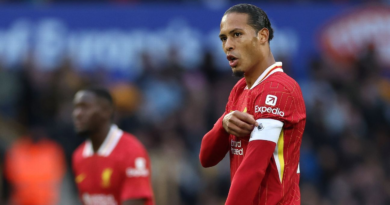Verstappen's predictable Suzuka win should have F1 worried
SUZUKA, Japan — Normal service resumed for Max Verstappen at the Japanese Grand Prix as he recorded a near-perfect weekend: pole position, fastest lap and race victory. Climbing out of the car, he looked like a man who had just been for a morning stroll in the park rather than someone who’d been wrestling with the might of a Formula One machine for the previous two hours.
Victory has become so routine for the Dutchman they must all feel like one these days.
Verstappen’s third win of the year came two weeks after a brake fire on his Red Bull car opened the door for Carlos Sainz‘s memorable victory at the Australian GP for Ferrari, which in turn had given fans a sliver of hope that this season might not be as one-sided as Verstappen’s romp to the 2023 title, but a second straight race without a victory — something that has not happened to Verstappen since July 2022 — never seemed on the cards at Suzuka.
Sunday’s win was so complete it prompted Mercedes boss Toto Wolff to throw in the towel on the 2024 championship on behalf of the entire grid with 20 races of F1’s longest-ever season still to run.
– Watch Formula One on ESPN networks all season long
“No one is going to catch Max this year,” Wolff said after the race. “His driving and the car are just spectacular. You can see the way he manages the tyres and basically this season now is best of the rest.”
It is hard to disagree. Verstappen has failed to win just 10 of the 48 races since he claimed his first championship at the controversial 2021 Abu Dhabi Grand Prix. Three of those 10 were won by Red Bull teammate Sergio Pérez.
Take Sainz’s Melbourne win of two weeks ago and his victory in Singapore last September out of the equation and the last non-Verstappen victory was at this exact point 12 months ago, at the fourth race of the season; last year that was Baku’s Azerbaijan Grand Prix, which this season has swapped places with Japan’s usual October spot on the calendar.
Verstappen’s thinly veiled threats to leave Red Bull last month around the Saudi Arabian Grand Prix and Wolff’s public interest in signing him for 2025 have at least kept headline writers busy for the past few weeks. But aside from race day in Melbourne, on-track surprises have been limited. Verstappen referenced the recent speculation about his future when told about Wolff’s comment.
“Lately Toto’s been really nice, saying a lot of nice things about me,” he said, laughing. Red Bull boss Christian Horner could not help but poke fun at his old rival when told what he had said on Sunday evening.
“It’s very early to write off the year. There’s still 20 races to go,” Horner said, before adding with a wink, “I’ve learned not to listen too much to what Toto says over the years.”
Regardless of whether Horner wants to listen to Wolff, most have shared that view of the season for a while. Some variation of “things would be so exciting if you took Verstappen and Red Bull out of the picture” is the most common argument you hear when people in the paddock discuss the competitiveness of F1 at the moment.
Since Netflix injected F1 with an unprecedented popularity boom with “Drive to Survive,” and with the memory of 2021’s blockbuster Verstappen-Lewis Hamilton title fight still in the recent past, it has become unfashionable to suggest the sport is in bad health. Certainly the budget cap has helped teams up and down pit lane into a better financial position than they’ve ever been before, although Williams and Alpine operating with no spare chassis at this stage of the season shows there are still issues. The field is closer from front to back, but the grid still has clustered into three distinct groups: Red Bull alone in one; Ferrari, McLaren, Mercedes and Aston Martin in another; the rest in the other.
Ultimately, how many people watch F1 dictates everything that follows, and that is dictated by the on-track product. Global ratings fell when Michael Schumacher dominated in the 2000s and again in the 2010s during Hamilton’s unrivaled reign, and they appear to be slipping away again. It’s fair to ask how many of the legion of new fans F1 has welcomed in recent years will turn their backs on the product if Red Bull’s dominance continues indefinitely.
F1 often likens modern races to a Super Bowl, but the obvious problem with comparing the product to the NFL’s showpiece event is that the winner of the Vince Lombardi Trophy is not a foregone conclusion four weeks into the regular season. Dominant spells have come and gone, and they will return again in F1’s future, but this one feels more extreme than those that have come before.
Shortly after declaring Verstappen the 2024 world champion, Wolff gave what was, frankly, an unconvincing argument for why fans should continue watching a season that runs to early December when the outcome is so predictable in April.
“I wouldn’t say it like this because the guy who is ahead is the deserving winner, and I believe that we’ve seen the Ferraris more closer to him in some of the previous races, and I think we can be closer to the Ferraris than we’ve shown today,” Wolff said. “So it is still exciting. I don’t know how the race was for you guys to watch. I’m just looking at our cars and split times so I never have a correct picture of what’s actually happening out there. I believe it’s pretty close between P3 and P2 and at times down to P8. I expect that there will be some action and we have just got to push ourselves to provide a better show and eventually challenge.”
Pérez finished 12 seconds behind Verstappen on Sunday, while Ferrari’s Sainz was 20 seconds back in the first non-Red Bull to cross the line. The only reason Verstappen did not lead every lap was that the variation of tyre strategies meant drivers pitted out of sequence to each other.
Ferrari has clearly turned a corner since the darker days of 2022 and could well fight for more victories this year, but Suzuka was a reminder that on race pace, they are still a clear step behind. They are not chasing a stationary target, either; legendary designer Adrian Newey and his technical team will be aggressively developing Red Bull’s RB20 to keep it out front.
And then there’s the man driving that car to all these victories. On days as routine as Sunday, when he appears to barely be scratching the outer limits of his generational talent or his car’s raw performance, you have to wonder just how much Verstappen still has left in reserve.
“You can hear the spare capacity he has in the car,” Horner said of Verstappen’s calm radio messages throughout the race. “He’s wanting to know about not just who is behind him, but … what lap times are they doing.
“The capacity he has is very impressive. The form that he had last year has just carried through. He’s got a very wise head on still pretty young shoulders.”
Raising concerns about the dominance of one team is not a dig at said competitor — Red Bull is where it is because it has done a better job than its rivals. Period. While a driver as gifted as Verstappen is in that car, their dominance appears set to continue into the foreseeable future.
F1’s success is ultimately dictated by how many people tune in, though. How long before the current situation becomes a more serious talking point remains to be seen, but alarm bells should already be ringing.




